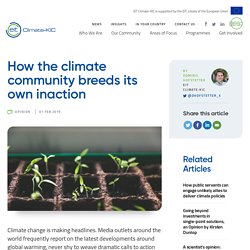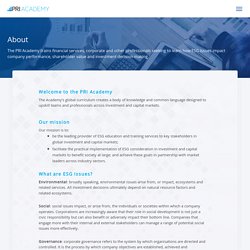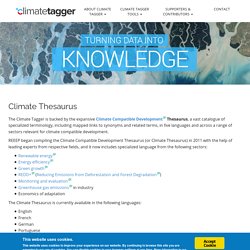

Pablo Santillán Caicedo
Knowledge management
Energy and Climate Change Glossary - Climate Tagger. Open Data & Knowledge Management. The Connecting Climate Knowledge Pathway and Portfolio were borne out of our deep experience in global climate compatible development efforts, our understanding of the technical data and knowledge systems that characterise the landscape and our success in advocating, designing and implementing solutions based on the principles of Open Data.

The Pathway is designed to unleash the vast potential in efficiency gains and improved decision making possible by breaking down "knowledge silos" and barriers, and creating tools and support mechanisms to enable technology transfer between and among creators, brokers and users of knowledge. Energy Information and Data. How the climate community breeds its own inaction. Climate change is making headlines.

Media outlets around the world frequently report on the latest developments around global warming, never shy to weave dramatic calls to action into their coverage. ‘We must act now!’ And ‘The world needs to do more!’ Are variations on a common theme we can read about almost daily. As well-intended as these pleas are, they are usually completely ineffective at triggering action. Widespread coverage of climate change is important for raising awareness and creating a sense of urgency among the broader public.
Here are some examples. Some people may counter that we know exactly what needs to be done to avoid dangerous climate change: Manage a rapid and far-reaching transition of almost every part of our economy, reduce carbon dioxide emissions from human activity to zero by 2050, and drive widespread adoption of carbon dioxide removal technology, for instance. InterAcademy Council Report Recommends Fundamental Reform of IPCC Management Structure. The process used by the Intergovernmental Panel on Climate Change to produce its periodic assessment reports has been successful overall, but IPCC needs to fundamentally reform its management structure and strengthen its procedures UNITED NATIONS — The process used by the Intergovernmental Panel on Climate Change to produce its periodic assessment reports has been successful overall, but IPCC needs to fundamentally reform its management structure and strengthen its procedures to handle ever larger and increasingly complex climate assessments as well as the more intense public scrutiny coming from a world grappling with how best to respond to climate change, says a new report from the InterAcademy Council (IAC), an Amsterdam-based organization of the world’s science academies.

These assessment reports have gained IPCC much respect including a share of the 2007 Nobel Peace Prize. About. Environmental: broadly speaking, environmental issues arise from, or impact, ecosystems and related services.

All investment decisions ultimately depend on natural resource factors and related ecosystems. Social: social issues impact, or arise from, the individuals or societies within which a company operates. Corporations are increasingly aware that their role in social development is not just a civic responsibility but can also benefit or adversely impact their bottom line. Companies that engage more with their internal and external stakeholders can manage a range of potential social issues more effectively. Climate, Community & Biodiversity Standards - Verra. Supporting land use projects in addressing climate change, benefitting local communities and smallholders, and conserving biodiversity The CCB Program The Climate, Community & Biodiversity (CCB) Standards identify projects that simultaneously address climate change, support local communities and smallholders, and conserve biodiversity.

Sustainable development in all parts of the world involves land management. When carefully designed, land management projects can improve livelihoods, create employment, protect traditional cultures and endangered species, help secure tenure to lands and resources, increase the resiliency of ecosystems and help to combat climate change. The CCB Standards can be applied to any land management project, including projects under the VCS Program, to certify such climate, community, and biodiversity benefits.
SKOS Simple Knowledge Organization System - home page. SKOS is an area of work developing specifications and standards to support the use of knowledge organization systems (KOS) such as thesauri, classification schemes, subject heading lists and taxonomies within the framework of the Semantic Web ... The FAIR Guiding Principles for scientific data management and stewardship. Supporting discovery through good data management.

Standards - W3C. W3C standards define an Open Web Platform for application development that has the unprecedented potential to enable developers to build rich interactive experiences, powered by vast data stores, that are available on any device.

Although the boundaries of the platform continue to evolve, industry leaders speak nearly in unison about how HTML5 will be the cornerstone for this platform. Climate Thesaurus - Climate Tagger. The Climate Tagger is backed by the expansive Climate Compatible DevelopmentClimate compatible development is development that minimises the harm caused by climate impacts, while maximising the many human development opportunities presented by transitions to a low emissions, resilient future.

Charting a path towards climate compatible development will be a major ... Thesaurus, a vast catalogue of specialized terminology, including mapped links to synonyms and related terms, in five languages and across a range of sectors relevant for climate compatible development. REEEP began compiling the Climate Compatible Development Thesaurus (or Climate Thesaurus) in 2011 with the help of leading experts from respective fields, and it now includes specialized language from the following sectors: Renewable energyRenewable energy is power generated from infinite sources, such as wind or solar power. Conventional energy is generated from finite sources, such as natural gas or fossil oil. Climate Tagger - Knowledge solutions to combat climate change. The PLACARD taxonomies for CCA & DRR: Development note and future work. As mentioned above, these taxonomies comprise a useful starting point for building comprehensive CCA and DRR taxonomies.

However, as also mentioned, there is much that can be improved. If taken forward and developed, these taxonomies can provide a foundation for building a Climate Action Knowledge Graph that truly transforms our ability to find, access, and use knowledge in CCA and DRR, which in turn would empower us to better leverage the huge potential offered by artificial intelligence applications. The road map for accelerated discovery and learning outlines how this can be done.
Key elements include: Further steps for improving these taxonomies are laid out in the taxonomy development note available to download in the right-hand column. Why Do We Invest? Motivation: Ever Wonder Why People Invest? Welcome to the 2nd post in this 4-part series, Getting Started in Impact Investing.

For more tips on getting started in impact investing, check out this recent post. Have you ever stopped to wonder why we invest? I did. Since the financial crisis in 2008, I have been reflecting upon why we invest in the first place and what it means to invest. Profit Motive Definition. What Is the Profit Motive? The profit motive is the intent to achieve monetary gain in a project, transaction, or material endeavor. Profit motive can also be construed as the underlying reason why a taxpayer or company participates in business activities of any kind. What Would Motivate Business Investment? Investors commit their money for basic reasons: to make a profit, to shelter tax liability and to participate in an interesting project that might add social value.
Investors in a small or startup company are looking for the same things. The better the chance the company will be a financial success, the more likely it is to receive investor money. But other influences, such as the economy and investment trends, also explain why investors are attracted to a business investment. Low Interest Rates The state of the economy creates motivation for investment in businesses.
Profit Another motivation for business investment is the potential for profit. Impact Impact investors seek simple, inexpensive ways to jump-start sustainable commerce that results in broad creation of wealth in a population. Why Knowledge Brokering is Key to Climate-Resilient Development. Climate adaptation planning, research and practice. The IPCC: Who Are They. The technical support units, co-chairs, and bureaus of each working group together assemble a list of proposed authors for its assessment, but the lead authors are selected by the entire working group.
Governments and non-governmental organizations around the world are invited to nominate potential authors. A government nomination does not imply that the scientist’s views are endorsed by that government, or that the scientist is expected to represent his or her government’s view. It may mean that a government has provided a scientist with financial support, but many scientists receive no direct financial support for their contributions to the IPCC and others are merely reimbursed for travel expenses.
Experts from developing nations who have received no financial support from their government are supported through the IPCC trust fund. In general, the appointed authors are widely recognized experts who represent a broad range of subject areas and opinion. Español — IPCC. La labor del IPCC se rige por un conjunto de principios y procedimientos claros para todas las actividades principales de la organización. Se revisan y actualizan constantemente esos procesos y procedimientos para velar por que sigan siendo sólidos, transparentes y fiables.
Para conocer los cambios recientes en los procedimientos del IPCC y acceder a información conexa, consúltese la Revisión de procesos y procedimientos (en inglés), que comprende todos los cambios recientes en los procedimientos del IPCC aprobados por el Grupo de Expertos en el período 2010-2012. En el documento Principios por los que se rige la labor del IPCC se exponen el papel del IPCC, su organización, la participación en dicha labor y sus procedimientos principales y se establecen la exhaustividad, la objetividad, la apertura y la transparencia como principios rectores de la labor del IPCC. The Paris Agreement: knowledge management and climate science denial. After lengthy negotiations, it was announced on Saturday that 195 countries had adopted the Paris Agreement, a new global agreement aimed at combating climate change. The Paris Agreement commits countries to “holding the increase in the global average temperature to well below 2 °C above preindustrial levels and pursuing efforts to limit the temperature increase to 1.5 °C above preindustrial levels”.